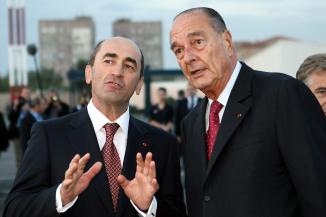
Kocharian and Chirac: Tete-a-Tete, But Eye to Eye?
Amidst all the hoopla and celebration surrounding the visit of French President Jacques Chirac's visit to Armenia we would like to interrupt the toasts to French-Armenian friendship with some sobering historical recollections.
True, the visit of Jacques Chirac, Europe's elder statesman, is veritably a great feather in the cap of Kocharian and Armenia in general. Given the on-going debate regarding Turkey's accession talks to enter the European Union, Chirac's pronouncements in Yerevan that Turkey should recognize its sordid past (read:Armenian Genocide) before entrance into the E.U. can only serve to further anger Turkey which already sees itself under assault from Europe and its calls for speedier improvements in human rights legislation and minority rights.
It is true that the countries of France and Armenia share a long history that dates back to at least the Cilician Armenian Kingdom of the 12th to 14th centuries. Back then, it was a marriage of convenience, literally in fact. Lucikly, when the marriage ended and the Crusaders disappeared, the Armenians remained.
Today however, given the newly founded French-Armenian love affair, it behooves us all to recollect a somewhat more tragic episode of French-Armenian relations that occured less than a century ago in Cilicia.
Here, we cannot recount all that transpired in Cilicia during the tumultuous years immediately following the 1915 Armenian Genocide. Suffice it to say that Cilicia was the scene of fierce rivalry between the Europeans who emerged victorious from WWI, a nascent Kemalist- lead Turkish nationalism and the Armenian genocide survivors.
According to Christopher Walker in his book
Armenia: The Survival of a Nation, " France had two political options in Cilicia that were mutually incompatible. That is to say when one failed, the other could be adopted." Walker writes,
"The first was to occupy the country directly, in the hope of turning it into a colony. This was the policy adopted at first. France's other option was to work with Turkey. France held 61% of the Ottoman Public debt, the tobacco monopoly as well as important concessions for Turkish railway construction, mining, ports, etc." (p. 293)
The 50-60,000 Armenians who made their way back to the towns in Cilicia they were forced to flee in 1915 found themselves between two competing nationalisms - the French and the Kemalist. In fact, France had laid claim to Cilicia and surrounding areas as early as 1916, when WWI still raged on, according to the
Sykes-Picot Agreement. Faced with an emergent Turkish nationalism spearheaded by Mustafa Kemal, the Armenians naturally sided with the French. In turn, the French played on the desperation of the Armenians, offering them promises of protection. All the French asked for in return was Armenian help in their struggle against the Kemalists.
The Armenians soon found themselves in a no-win situation. As the Kemalist forces gained the upper hand, the French began a hasty retreat from Cilicia. In Marash, Hadjin, Aintab and elsewhere, despite heroic attempts to resist, Armenians were forced to flee their homes once again.
This time, just as in the 14th century, the French and their armies disappeared. But unlike the Crusaders, this time the French made sure to protect their strategic and economic interests. By early 1921, France's Prime Minister Aristide Briand had negotiated a separate peace with the Kemalists. The French would abandon Cilicia and in return they would be given priority for a wide range of economic concessions. The peace treaty also called for the "widest possible partnership between Ottoman and French capital."
So...President Chirac...Bien Venue en Armenie. Enjoy our famous Armenian hospitality.
And to President Kocharian we offer these words of caution penned by Lord Byron himself...








.1.jpg)
